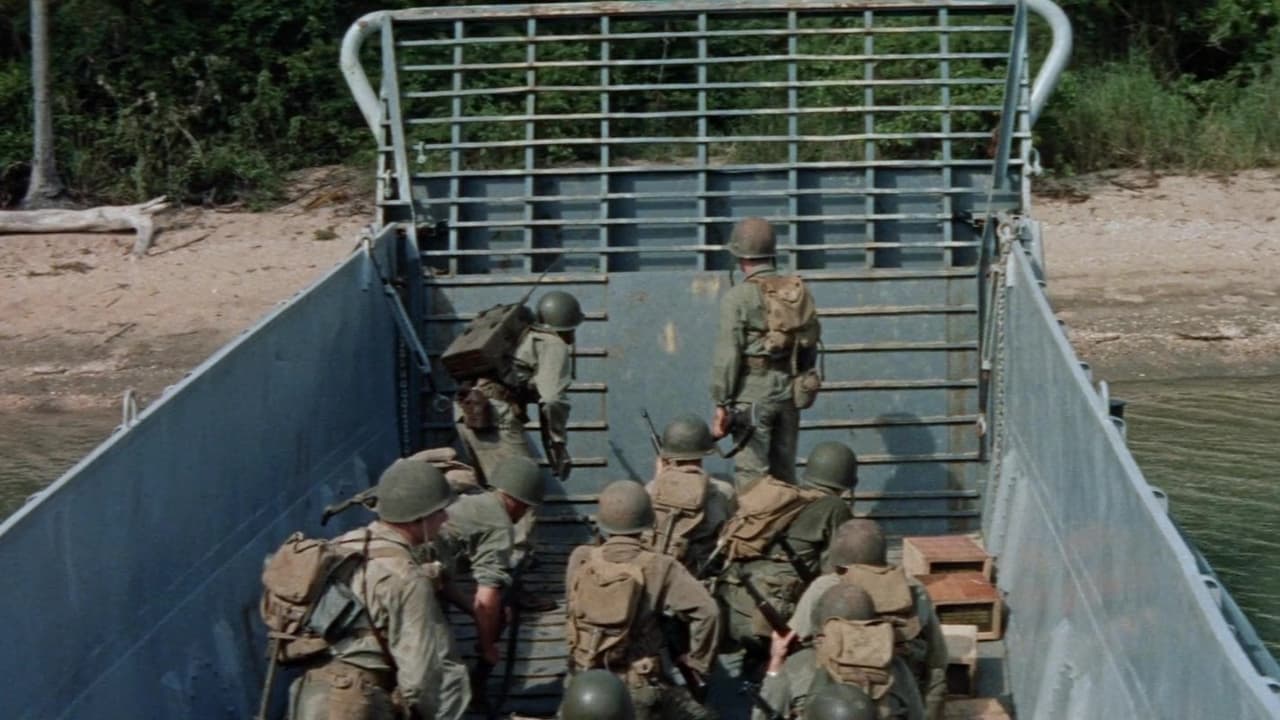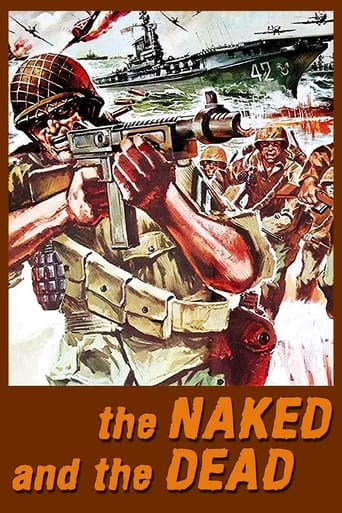

*Analysis of the characters in the filmThe main point in the film was the conflict between Hearn and Cummings. Hearn was the representative of humanity and moral, and Cummings was the opposite against him. There were several events showing the conflict. Once Cummings summoned Hearn afterward and chastised him for the remark, then cautions him against treating the soldiers humanely and urges him to accept that war means killing and death. Cummings suggests that Hearn instill fear and hatred in his men, but the lieutenant rejects Cummings' notion as immoral. Second Cummings tells Hearn that in this moment of great destiny for America the only morality is power. There are also several branch lines about the platoon. Most of them are tragic. For example, Gallagher is devastated to learn that his pregnant wife has died in childbirth. Croft, who was painful because the infidelity of his wife, turn out to be calloused and brutal, and during the initial landing does not hesitate to personally execute a Japanese prisoner. Wyman, who is bitten by a poisonous snake and dies quickly at a river crossing. When Hearn's group is fired upon from the grove, Wilson is wounded. Despite Croft's protest, Hearn orders him to be taken back to headquarters, but the corporal dies moments later. Roth sprains his ankle during the dangerous climb and then later freezes in fear on a narrow precipice. Intending to spur Roth on, Croft calls him a "lousy Jew," causing the soldier to bolt and fall to his death. Fearing Croft will lead them to their deaths, Red challenges him but backs down when the sergeant threatens to kill him. At the peak, Croft investigates the other side of the hill alone only to be shot and killed by another Japanese patrol. What leads these people to the deathful disaster is not the cruelty of war, but the fear which is produced by people himself.At the end of the film, Cummings visits the recovering Hearn in the infirmary a few days later. Hearn tells the general that Ridges and Goldstein's dedication saved his life and bolstered his belief that man's innate decency will survive the viciousness of war. Maybe this is an optimistic expectation to reveal the commitment about humanity.*The theme of the novelThe story is not simply a narrative of a long war, but something deeper. It reflects a social and historical themes. The background of the story is a fictional and tropical island. There are two parallel clues: the war and the people in the war.The story takes place on an island in the South Pacific, allowing readers to see the relationship between officers and soldiers in the American army, which is also a microcosm of American society. Therefore, "The Naked and the Dead" is over the scope of war literature. It is a symbolic to the contradiction between barbarity and humanity. The meaning of "Naked" in the title is "unshielded" and "non-protection". It can also be understood as "the explosion of human". The thought behind the novel is realism and social criticism. It also has a strong naturalistic color. By using the behaviour out of fear and horror to describe the people as "the Naked and the Dead", Mailer seems to warn the public that fascism may revive in this century. This is an innovation to those regular war theme novels."They are always living in the wild and irrational ...... and I am lost in the kaleidoscope of death inside." Perhaps there are always only two characters in Norman Mailer's novel: "the Naked", who lose the conscience of humanity, and "the Dead", the shadow of death shrouded. *Differences between the novel and the filmWhen Norman Mailer saw the movie one night with his second wife, Adele, he complained to her that Hollywood "had ruined his story." Raoul Walsh, the director, is quoted in the article as saying the film would not stick too closely to the novel, as many of the incidents that were considered shocking at the time of the book's release had already appeared in other films. He had the script rewritten--often as the film moved through production--and added vivid battle scenes including flamethrowers and tanks, that were nowhere in the novel.The apparent differences between the novel and the film were the characters. In the film, Hearn was wounded, not killed as he was in the book. The flashbacks featuring Hearn also sharply contrasted his cavalier civilian playboy behavior with his serious consideration of moral issues.The ill-fated Sergeant Croft, who it was explained, was driven by an overweening urge to command because of the memory of an unfaithful wife. From his actions in the film, however, one was led to think that he just liked killing.Roth, the Jewish soldier who was accidentally killed on patrol. In the novel, Roth was drawn as an intellectual who is ambivalent about his Jewishness but is unable to escape anti-Semitism. The film portrayed the cruel anti-Semitism of Roth's fellow soldiers but ignored the complexities of his own personality.Wilson, a hard-drinking country boy who died in the book (but made it through the movie). Among the major changes from the book to the film, the ending of the film was the most affirmative. In the book, the idealist "Hearn" was killed and the sadistic "Croft" survived. Norman Mailer showed a pessimistic view of humanity, but the film weakened it. The film caught neither the spirit nor the intent of the original yarn and became just another war picture.Mailer was so disappointed that he filed suit against RKO Teleradio Pictures and Warner Bros in 1963, seeking reversion of all rights to "The Naked and the Dead". The suit was dismissed.*The film review"The Naked and the Dead" has resulted in a professionally but derivative action drama, which is no more memorable than similar sagas of strife that have preceded it. Director Raoul Walsh has filled the screen with striking vistas in beautiful color, the chilling sound and the fury of conflict, but the hearts, minds and motives of men exposed to sudden and often useless death, which gave the book its awesome power, serve merely as sketchy background to battle in this uneven picturization that was unveiled at the Capitol yesterday.The film was come up with an aspect recounted by a platoon, doomed to decimation in securing a small island in the Pacific in 1943. The resentment, passions, brutalities and backgrounds of the men were stated and restated but were generally left with the impression of actors' speaking lines. Here we can see the platoon is in brief and personal outline. They are lonely in a terrible world they never made. They are afraid, they hate the jungle, their rugged assignments, themselves and each other. They recall their sweethearts and wives often. Some are lucky and do survive but others not. It was nearly always as simple as that.Although the Sanders' dialog is plentiful but short of nuances, the platoon's stealthy trek, its skirmishes with Japanese patrols and the massive, climactic assault have been directed with the terrifying realism. It was a great war film. A viewer cannot help but recall scenes of the burning of enemy troops as the lush grass is ignited by the hidden G. I.'s; the death throes of a private bitten by a snake; the tension of the men as they try to scale a sheer cliff, the sounds and the look of the jungle, which have been beautifully captured in this color film. Director Walsh and his associates have carefully drawn an impressively stark face of war from "The Naked and the Dead" but only seldom do they deeply dissect the people involved in it.
... View MoreNorman Mailer's classic novel receives weak treatment in this film.First, we see a bar in Honolulu where the cops raid the joint frequented by GI's in 1943. Then, we see newspaper clips of defeats suffered by our guys in the Pacific. Then, we get a movie. Where exactly in the Pacific is the action going on?The weak writing still allows for 2 solid performances by Aldo Ray, as a vicious sergeant, who enjoys pumping bullets into his Japanese captors and Raymond Massey, as an army head who feels that he gets the best out of his men by being tough and cruel as well.In flashback sequence, we see Ray married to Barbara Nichols, the dumb blond who knew occasionally how to turn in a good dramatic performance. Her acting here is amateurish at best. In fact, she sounds as she did on the old Ed Sullivan Show when she told the Romans that she begged Julie (Caesar) not to go to the forum. Not here, unfortunately! Flashbacks also bring us back to Robertson's civilian life where all he did was to cavort around lots of women.Cliff Robertson is Massey's assistant, who soon falls out of favor with the latter when they disagree on Massey's philosophy. Robertson, who smokes heavily in the film, gets shot for his efforts and becomes very preachy at the final scene of this film.There is plenty of anti-semitism to go around in this movie as well. Jerry Paris, as Goldstein, is coerced to his death by a fall over a mountain by being called a lousy J--. Joey Bishop has to fight an anti-semitic soldier as well. One funny scene is where Bishop throws away a sandwich when he finds out that it's made up of ham!
... View MoreFrom Norman Mailer's celebrated book about kill-happy Army sergeant in the Pacific, 1943. In the lead, handsome Aldo Ray gets a chance to show his swagger portraying a man doing battle with the enemy as well as with himself and his own men; otherwise, this glum effort is War-is-Hell routine. Bernard Herrmann's score sounds suspiciously like the one he turned in for "Taxi Driver" in 1976. Hmmm....
... View MoreI saw this movie on a local PBS station about the same time I was writing a Term Paper on the novel. I have already read the novel several times, but I still thought that the movie perspective might be helpful. Needless to say I was wrong. The movie turns a book about the futility of the individual's role in war into a boiler plate feel good war movie w/ a happy ending. One of the most important parts of the novel, where Hearn is betrayed despite his best efforts to be a "good" leader, is scrapped. Hearn not only survives, but the movie goes on the kill the ass hole, Sgt Croft. In the book we see a group of individuals who all want to singlehandedly make a difference and who all end up failing because modern war has grown beyond the control of the individual. In the movie we see a division of good guys and bad guys where where good guys win and the bad guys get what's coming. Finally I would like to point out that this movie is a waste of time or unpleasant to watch. If its going to be on TV by all means watch it, but if you've read the book brace yourself to be VERY disappointed.
... View More